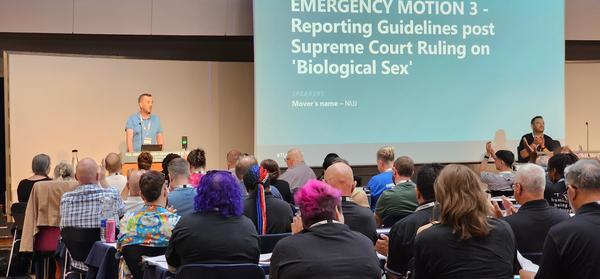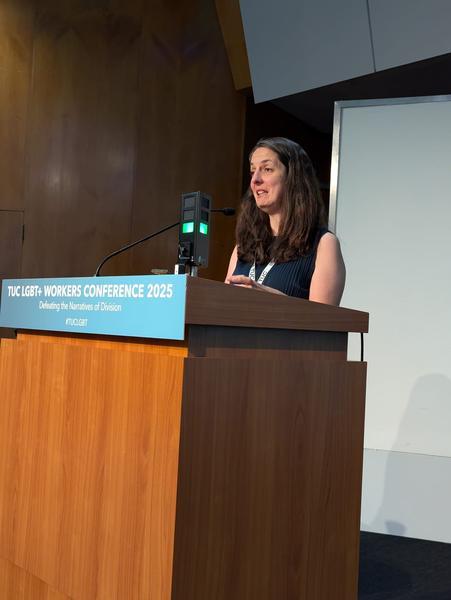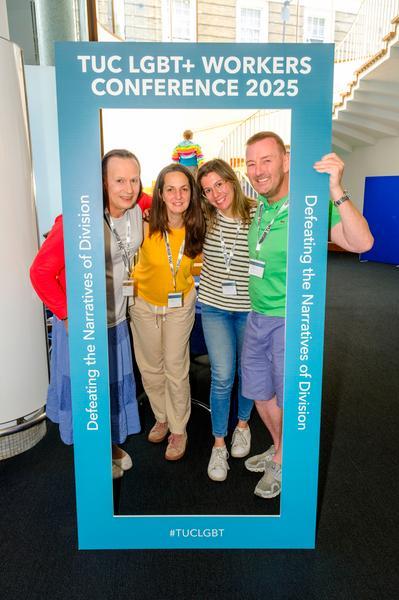TUC LGBT+ Conference 2025
NUJ motions on trans solidarity and ethical journalism were passed at this year’s Trades Union Congress (TUC) LGBT+ Conference.
Held at Congress House in London from 3-4 July, the conference emphasised the importance of intersectional solidarity throughout the trade union movement.
Last year a TUC survey found that half of LGBT+ workers have experienced bullying or harassment in the last five years. Opening the conference, Maria Exall, TUC LGBT+ Committee chair, noted that the Employment Rights Bill would “introduce a framework for the recognition of union equality reps, helping us fight for equality directly at the workplace.”
One in 20 LGBT+ workers experience physical violence. Discrimination is particularly prevalent against trans workers with 80% experiencing bullying and harassment.
The NUJ delegation consisted of Cristina Lago, James Doherty, Natasha Hirst, and observer Kate Pearce. An emergency motion by the NUJ called on the TUC to promote the NUJ’s LGBT+ reporting guidelines, which complement the union’s Code of Conduct on ethical reporting. James Doherty noted that the public discourse had become increasingly sensationalist and divisive, criticising “blatant attacks on our trans and non-binary communities who have been stripped of their rights, vilified and marginalised in a campaign of fear, disinformation and slander.” Doherty continued:
“We have watched as one of the most marginalised and vulnerable communities in our society has been left in a state of fear and isolation, with often terrible impacts on their safety and physical and mental health. Let us begin today by being clear that when they come for one, they come for all - and we stand with our trans and non-binary comrades. Our tears will be those of joy when we win our collective battle against this injustice. The role of the media in this fight has never been more important.”

James Doherty at the TUC LGBT+ Conference.
The motion, which was seconded by the Musicians’ Union (MU), called for the TUC’s support in updating the guidelines alongside LGBT+ groups. It carried and delegates subsequently selected an emergency composite motion on the Supreme Court ruling to be discussed at the 157th annual TUC Congress in September. Later that day a panel discussion focused on the far-right’s weaponisation of LGBT+ issues. Conference agreed on the need for collective action to promote digital literacy and accurate representations of the LGBT+ community.
The NUJ seconded the MU’s motion calling on the TUC to lobby the UK government to end the criminalisation of LGBTQ+ people worldwide. Natasha Hirst said:
“Like our colleagues in the MU and other creative unions, many NUJ members work in a variety of roles that take them across borders. Whether photographing, reporting or broadcasting on events worldwide, our LGBTQ+ members also face similar dilemmas and challenges about their safety. Press freedom and freedom of speech are at the core of LGBT+ equality and are an essential pillar of trade union rights.
“However, we are facing a coordinated backlash against these rights both at home and abroad. We’ve seen increasing attempts worldwide to stifle criticism of homophobic and transphobic behaviour and policies. We know that where homophobia and transphobia thrives, so too does misogyny, ableism and racism. LGBT+ journalists have been subject to campaigns of disinformation and online violence, impacting on their professional and personal lives. Many NUJ members are freelance, lacking the support of an employer and there are already too many examples of freelances being sent out to cover dangerous situations without adequate support or protection.”
Delegates from the National Association of Schoolmasters Union of Women Teachers (NASUWT), Public and Commercial Services Union (PCS), National Union of Rail, Maritime and Transport Workers (RMT), and Unison also spoke in support of the motion.

Natasha Hirst at the TUC LGBT+ Conference 2025.
Hirst later moved the NUJ’s motion urging protection for human-made ethical journalism and resistance to regressive AI-generated content. While acknowledging the potential positives of AI, Hirst expressed deep concern that the government is not taking ethical threats seriously:
“Large Language models for the production of generative AI, are trained on massive datasets – stolen without consent or payment from across the internet. Almost anything that is online has been scraped for content: words, photos, videos, audio and everything else. That content includes disinformation, and hateful, discriminatory content.
"Across a wide range of equalities groups, it produces generative AI outputs that reinforce and perpetuate often harmful and disrespectful stereotypes that we’ve spent decades fighting against. It compounds heteronormative biases, reinforces binary gender norms, and overlooks the diversity and pure magnificence of the LGBTQ+ community.”
The prevalent and insidious spread of disinformation comes in a climate of hostility against diversity, equality and inclusion (DEI) programmes and principles in both the UK and US. Hirst said that this will result in the censorship or erasure of diversity-related content – including the stories, achievements and work of LGBT+ communities. The motion carried.
Other motions passed during the two-day conference included ending HIV stigma, developing an LGBT+ workplace manifesto and charter, and saving small LGBT+ cultural and community institutions. 236 delegates attended the conference with 32 unions represented.

The NUJ delegation at the TUC LGBT+ Conference 2025.
© Jess Hurd
